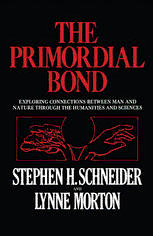
The Primordial Bond: Exploring Connections between Man and Nature through the Humanities and Sciences PDF
Preview The Primordial Bond: Exploring Connections between Man and Nature through the Humanities and Sciences
THE PRIMORDIAL BOND Exploring Connections between Man and Nature through the Humanities and Sciences THE PRIMORDIAL BOND Exploring Connections between Man and Nature through the Humanities and Sciences Stephen H. Schneider and Lynne Morton Plenum Press . New York and London Library of Congress Cataloging in Publication Data Schneider, Stephen Henry. The primordial bond. Bibliography: p. Includes index. 1. Human ecology. 2. Humanities. 3. Science. 4. Philosophy of na ture. I. Morton, Lynne, joint author. II. Title. GF50.S36 304.2 80-20376 ISBN-13: 978-1-4684-1059-4 e-ISBN-13: 978-1-4684-1057-0 DOI: 10.1007/978-1-4684-1057-0 © 1981 Stephen H. Schneider and Lynne Morton Softcover reprint of the hardcover 1s t edition 1981 Plenum Press, New York A Division of Plenum Publishing Corporation 227 West 17th Street, New York, N.Y. 10011 All rights reserved No part of this book may be reproduced, stored in a retrieval system, or transmitted, in any form or by any means, electronic, mechanical, photocopying, microfilming, recording, or otherwise, without written permission from the Publisher My interest is in the future because I am going to spend the rest of my life there. -CHARLES F. KETTERING PREFACE Does the solution to our energy crisis depend upon the de velopment of coal, nuclear, solar, or some other energy source? Are we better off because science and technology have made us less vulnerable to natural catastrophes? How, in fact, do we see ourselves now in relation to our natural world? The answers to these questions lie as much within the humanities as in the sciences. Problems as seemingly unrelated as our vulnerability to OPEC oil price hikes or a smog alert in Los Angeles or Tokyo often have common, hidden causes. One of these causes is simply the way our society sees its place in nature. There are many reasons for the heavy demand for oil. Among these we vii viii I PREFACE can include desire for industrial growth, hopes for improved living standards, mobility through automobiles and rapid transportation systems, and, not least, an attempt to loosen the constraints on man imposed by nature. These constraints and man's concomitant dependence upon nature are exam ples of the intense and finely interwoven relationship be tween man and nature, a relationship that constitutes a pri mordial bond forged long before the era of modem technology. Similarly, man has explored this primordial bond through the humanities for all the centuries prior to our present techno logical age. As we will see in this exploration, the bond un derlies many of the environmental and technological prob lems we have come to label the ecological crisis. It includes such now "classical" environmental issues as pollution, in addition to related technological problems of energy, health, transportation, hunger, and even war and peace. To be sure, how we see our place in nature is "only" one component of these issues, but it is a significant aspect. It is of more than academic interest to trace the impor tance of our feelings about the primordial bond, for if they really are, as we intend to prove, among the main determi nants of the "ecological crisis" (broadly defined), then solu tions to the crisis will have to recognize and account for these feelings as well. In order to find solutions, we will need to search our artistic, literary, religious, and philosophical her itage for clues to how people have felt about the man/nature relationship. Then we will need the help of the sciences to demonstrate what is known about the physical, the biological, and even the social world in which we live. Finally, we will confront specific issues of conflict, whose resolution will in volve choices and actions. Since choices and actions involve values, we must return again to the humanities, for it is here that we find numerous offerings to help us interpret our feel- I PREFACE ix ings and so crystallize our values. The varied disciplines of the humanities and the sciences will be tapped selectively to help us explore the connections among man, nature, art; sci ence, and the ecological crisis. Our approach is to combine technical and ethical judgments into a search for solutions to pressing environmental and related technological problems. ACKNOWLEDGMENTS. We deeply appreciate the close working relationship we have enjoyed with our editor, Linda Greenspan Regan. Her philosophical, substantive, and other editorial suggestions leave a major imprint on the book. We also wish to thank Robert Chervin, Robert Chen, Randi Lon der, Richard Shields Redman, Richard Regan, Allyn Shaloff, Deborah Feigenbaum, and, in particular, Samuel and Doris Schneider, and Leonard and Barbara Morton. Cheryl K. Schneider not only offered timely editorial comments on var ious manuscript drafts, but also provided considerable typing help when deadlines were tight. Finally, we appreciate the efforts of the graphics and photographics people at the Na tional Center for Atmospheric Research in preparing some of the illustrations and the general help from Mary Rickel in tying up a number of loose ends in the process of delivering the completed manuscript. CONTENTS Chapter 1 MAN APART? 3 Chapter 2 POETRY AND PLUTONIUM 21 Chapter 3 HUMANISTIC EXPRESSIONS OF CYCLES IN NATURE 43 Chapter 4 / REACTIONS TO THE PRIMORDIAL BOND EXPRESSED IN THE HUMANITIES 75 Chapter 5 ANCIENT GREEK NATURAL PHILOSOPHY: THE BRIDGE TO SCIENCE 123 xi I xii CONTENTS Chapter 6 / WHAT IS SCIENCE? 147 Chapter 7 THE GLOBAL CYCLES OF LIFE 177 Chapter 8 / HUMAN DISRUPTIONS OF THE GLOBAL CYCLES OF LIFE 243 Chapter 9 THE SOCIAL TITHE 283 REFERENCE NOTES 303 BIBLIOGRAPHY 313 INDEX 317 The first mistake is to think of mankind as a thing in itself. It isn't. It is part of an intricate web of life. -ISAAC ASIMOV
